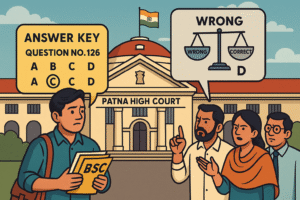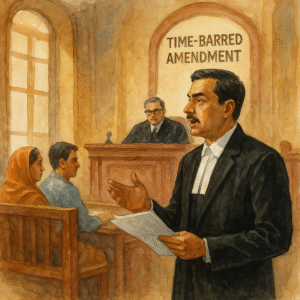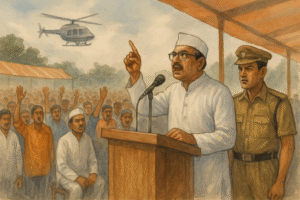The Patna High Court, in a civil miscellaneous petition arising from a partition suit, has clarified that an amendment which introduces a time-barred claim after the commencement of trial cannot be permitted unless the party demonstrates due diligence, as required by the proviso to Order VI Rule 17 of the Code of Civil Procedure (CPC). The oral judgment was delivered on 27 January 2025 by Hon’ble Mr. Justice Arun Kumar Jha, allowing the petition and setting aside the trial court’s order which had earlier permitted such an amendment.
In brief, the litigation stems from a partition suit in which the plaintiffs had originally sought a half-share in the suit property. During the trial, the plaintiffs applied to amend the plaint to add prayers for declaration that certain instruments—specifically a gift deed and a will attributed to the parties’ mother—were invalid and not binding. The opposing side objected, pointing out that these instruments had been executed several years earlier and had already surfaced in connected proceedings (including a probate case), making any challenge clearly beyond the three-year limitation period.
The trial court nevertheless allowed the amendment subject to costs, reasoning that doing so would serve the larger cause of justice and avoid multiplicity of proceedings. In the High Court, the respondents defended that approach, relying on a previous Patna High Court decision (Kamal Kishore Prasad v. Sri Lal Kumar Rai & Ors., C.Misc. No. 657 of 2017) and taking support from the Supreme Court’s ruling in Life Insurance Corporation of India v. Sanjeev Builders (P) Ltd., 2022 SCC OnLine SC 1128.
The High Court disagreed. It noted, first, that the amendment was sought after the trial had commenced, which directly triggers the stricter standard set out in the proviso to Order VI Rule 17: no amendment after commencement of trial unless the party shows that despite due diligence the matter could not have been raised earlier. Second, on the facts, the additional reliefs sought to be introduced were clearly time-barred; the plaintiffs had knowledge of the instruments 6–7 years earlier, and no explanation amounting to due diligence was offered.
The Court drew guidance from the Supreme Court’s jurisprudence. While Sanjeev Builders recognizes a generally liberal approach to amendments, it also underscores that a proposed amendment introducing a time-barred claim is a significant negative factor. The Court further relied on the Supreme Court decision in Radhika Devi v. Bajrangi Singh, AIR 1996 SC 2358, which cautions against permitting amendments that defeat accrued rights by limitation and distinguishes clarificatory amendments (generally permissible) from those that add time-barred causes.
Ultimately, the High Court held that the trial court’s order was unsustainable and set it aside, allowing the civil miscellaneous petition.
Significance or Implication of the Judgment
This decision is an important procedural ruling for civil litigants and trial courts in Bihar:
- It reinforces that after the commencement of trial, Order VI Rule 17’s proviso is not a formality but a strict gatekeeper. A party must show genuine “due diligence” for not raising the matter earlier; mere convenience or a desire to consolidate issues will not suffice.
- It cautions that amendments cannot be used to revive stale claims. If a fresh suit on a proposed claim would be barred by limitation, introducing that claim by amendment is equally impermissible. This protects accrued rights and prevents prejudice to the opposite party.
- It offers clear guidance to trial courts: the desire to avoid multiple proceedings cannot override express statutory constraints. Multiplicity is a factor, but not a license to bypass limitation or the due-diligence requirement.
- For litigants, the judgment is a reminder to plead all necessary reliefs at the earliest and to promptly challenge instruments like gift deeds and wills within the prescribed period. Delay risks foreclosure of relief at later stages, even if the underlying controversy is still live.
- For government and public bodies regularly involved in civil litigation, the ruling helps streamline proceedings and reduce delays caused by late, expansive amendments that inject time-barred disputes mid-trial.
Legal Issue(s) Decided and the Court’s Decision with reasoning
- Whether a plaint can be amended after commencement of trial to introduce challenges to instruments (gift deed/will) that are already time-barred.
• Decision: No. The proposed amendment sought to introduce a time-barred claim; such an amendment is impermissible, particularly after trial has commenced. - Whether the plaintiffs demonstrated “due diligence” under the proviso to Order VI Rule 17 CPC.
• Decision: No. The record showed the plaintiffs had knowledge of the instruments 6–7 years earlier; failure to seek amendment earlier was negligence, not due diligence. - Whether the trial court was justified in allowing the amendment to avoid multiplicity of proceedings.
• Decision: No. Avoiding multiplicity cannot justify permitting a time-barred amendment after trial commencement, absent due diligence. The trial court erred in law. - The effect of Supreme Court guidance (Sanjeev Builders; Radhika Devi) on the amendment request.
• Decision: The High Court applied these precedents to hold that while courts are liberal with amendments, they must refuse those that defeat accrued limitation rights. Clarificatory amendments may pass; substantive, time-barred additions do not.
Judgments Referred by Parties
- Kamal Kishore Prasad v. Sri Lal Kumar Rai & Ors., Civil Misc. No. 657 of 2017 (Patna High Court), judgment dated 12.06.2016 (relied upon by respondents to support a liberal approach to post-trial amendments).
- Life Insurance Corporation of India v. Sanjeev Builders (P) Ltd., 2022 SCC OnLine SC 1128 (cited by respondents for the general principle of permitting amendments to decide real controversies).
Judgments Relied Upon or Cited by Court
- Life Insurance Corporation of India v. Sanjeev Builders (P) Ltd., 2022 SCC OnLine SC 1128 — applied with the caveat that time-barred claims weigh against amendment.
- Radhika Devi v. Bajrangi Singh & Ors., AIR 1996 SC 2358 — quoted at length for the principle that amendments should not defeat accrued rights by limitation; distinguishes clarificatory amendments from substantive additions.
- Laxmidas Dahyabhai Kabarwala v. Nanabhai Chunilal Kabarwala, (1964) 2 SCR 567 — referred within Radhika Devi and acknowledged by the High Court for clarificatory-amendment principles.
Case Title
Brij Mohan Mishra Vs. Krishna Mohan Mishra
Case Number
Civil Miscellaneous Jurisdiction No. 576 of 2019.
Citation(s)
2025 (1) PLJR 745
Coram and Names of Judges
Hon’ble Mr. Justice Arun Kumar Jha.
Names of Advocates and who they appeared for
For the petitioner: Mr. Raghav Prasad, Advocate. For the respondents: Mr. Dhurendra Kumar, Advocate; Mr. Sumit Kumar, Advocate.
Link to Judgment
NDQjNTc2IzIwMTkjMSNO-WJ–ak1–Zn5UTTwM=
If you found this explanation helpful and wish to stay informed about how legal developments may affect your rights in Bihar, you may consider following Samvida Law Associates for more updates.








